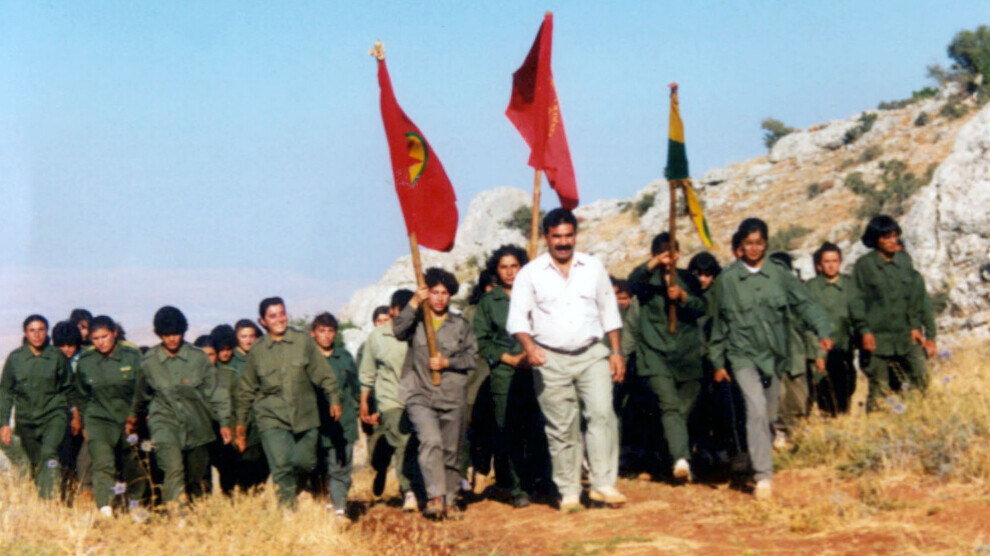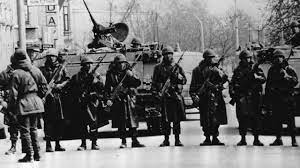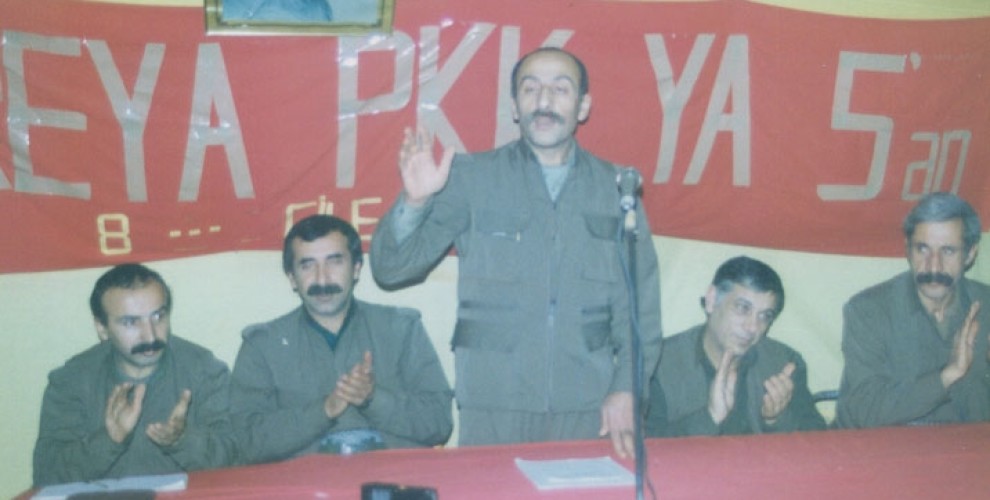
We are approaching the 25th anniversary of the international complot against the PKK leader Abdullah Öcalan, which started when he left Syria on the 9th of October 1998. This complot is continuing until this very day. The 25 years where filled with resistance, of which hundreds of people burned themselves in protest, hundreds became injured and fell through various hunger strikes and many years of total isolation against Abdullah Öcalan.
This international complot is an expression of a political strategy of the hegemonic western powers, as they are vanguards of capitalist modernity, whose beginning is in the days when these powers started to stretch their hands into the Middle East. The main pillars of these politics are the exploitation of resources and the control of the area for geo-strategical reasons. In this strategy, the role of the colonial Turkish state from the beginning was defined as a political construction to guarantee these interests, one should not be fooled by anti-western statements that were made from time to time by Turkish state officials. Daily political events can hold contradictions, but the essence of the Turkish state outlives these turbulences. The creation and the role of Turkey is full of plots and hidden protocols and is mostly told in a way that hides it’s true nature. Therefore, only some aspects can be drawn attention to.
A bulwark against the “threat” of communism
To better understand the international role of the so called Republic of Turkey, it is necessary to know that its founding was pushed forward and made possible by the hands of Western imperialism, initially Great Britain. On one hand it should have served as a “buffer zone” against the Balkans and the Caucasus out of fear of soviet expansion, the “communist danger”. On the other hand it should have opened the Middle East for Great Britain’s politics, therefore a modern nation state was needed to destroy the influence of other powers. Joining NATO in 1952, Turkey became an important pillar for its politics, essentially continuing playing the role that was given to it from the start. This period saw mass military expansion via USA funding and CIA backed training, including nuclear arms deployment that were in range of Moscow. The NATO strategy of the 70’s and 80’s was the destruction of all revolutionary forces and left wing organizations, especially within the Middle East to prepare the grounds for an imperial and capitalist offensive. In this frame, NATO developed new strategies of warfare, especially after the failing of classical imperialism in Vietnam. During this situation in Turkey there were strong revolutionary movements that influenced the whole of society and therefore became a danger for the Turkish state.
Anti-revolutionary precautions were taken

After the fall of the Ottoman empire in 1922, the Kemalist’s (nationalists followers of “Kemalism” introduced by Mustafa Kemal Attatürk) wanted to create a homogeneous Turkey, oppressing ethnic minorities and pushing nationalistic ideas on the people within its newly defined state borders. The logic of fascism that would later rise heavily in Europe was first applied in the genocidal regime of Turkey.
On one hand, the plundering and expropriation of Armenian and Assyrian property and capital through massacres should lay an economical basis for the integration of the region in the capitalist system. At the same time, the forceful and violent creation of homogeneous people with a homogeneous culture was necessary to govern the new state but also to eliminate other feudal and ethical influences and authorities that would hinder the establishment of capitalism.
This resulted in the banning of the Kurdish language, culture and identity and enforcing the states “one nation one language” ideology. This “Turkification” can be named as a “white” genocide. Against these politics, numerous uprisings occurred including the Ararat rebellion and the Dersim rebellion, to name a few. They can be seen as a reflex of self-defense by the Kurdish society, some rebellions were more strategically organized then others. Again, the suppression of these uprisings and following massacres can not be separated from Imperialist politics, those imperial forces saw a danger for their anti-communist bulwark in what they called “separatist tendencies”. Therefore, military support, both material as well as experience was transferred to Turkey.
To prevent such uprisings in the future, precautions were taken: CIA trained and financed. “Stay behind teams” were built up in Turkey and throughout the world in an effort to put down anti-state uprisings and protests, infiltrate and eliminate left wing movements and organizations and to repel a communist armed expansion and invasion if necessary. This training included torture techniques, psychological warfare, propaganda, infiltration, subversion and direct action against those the state deemed a threat. Most of this training was to be given to fascist groups, in Turkey this was taught predominantly to the “Grey Wolves”. These “counter guerrilla” were given the green light to assassinate anyone it deemed necessary. Turkeys position politically and geographically held strategical importance to NATO and the USA’s imperial interests. Not only could it be a useful tool to halt Soviet expansion, but to be a launching point to quell unrest within the Middle East and the surrounding areas. This would be in the form of trying to subdue the people of the region whom the USA had difficulty controlling and using for their own selfish interests, opening the door to be able to expand their sphere of influence within the middle east. Up until today, one can see the strategical importance of Turkey for NATO within this region. One of the marks of the this outreach to the region after the second World War was the establishment of the Incirlik Air Base in southern Turkey. It was built in the 1950’s for the United States Air Force and has been used to lunch reconnaissance missions over the soviet union, transport US troops during the war in Iraq, and to this day holds up to 50 nuclear weapons.
A great and bloody offensive of capitalism
In 1969, Left wing student protests resulted in a counter demonstration by fascists, with the assistance of the police. Attacks occurred on the protesters with knives, clubs and chains. This resulted in the killing of 2 people, over 100 injured and many more arrests. This incident became known as “Bloody Sunday”. This is just one of the many examples in which the state and fascist groups collaborate.

During this time in Turkey, with a growing opposition to the fascism of the state, left wing ideologies spread further through the masses, especially through the universities. Harsh crackdowns by the police occurred resulting in numerous prison sentences for protesters. Consequently, the prison systems in Turkey adopted a mentality of militarism, which its aim was to force upon the people a doctrine of “turkification”. This included physical and psychological warfare to pacify and subdue those who held differing ideas.
Rêber APO writes in his defense writing “Beyond State, Power and Violence”: “The 1970’s was the beginning of a period in the capitalist system’s history when a significant rupture became apparent. […] The real socialist system was at the apex of its influence, and the national liberation movements were at their strongest. […] Moreover, a new capitalist class and bureaucracy had emerged from their midst that was even more backward than that of classic capitalism.” The crises of these models and the lack of freedom and equality within them led the people to seek an alternative. This period saw a rise in opposition with the emergence of the New Left, the ecological movements, anti-war movements and feminism. This reality represented a serious threat to the legitimacy of the capitalist state. As a result, the CIA backed Grey Wolves intensified their suppression within Turkey. During this time in Turkey, the military staged a coup in 1971 and when in power, introduced new laws to strengthen state authority curtailing civil liberties. We witnessed the ever changing and evolving Gladio (the code name for the clandestine “stay behind” operations) tactics of the Turkish state, as fascism started taking a strong stance against Communist, Socialist, Marxist, Leninist and all other left wing ideologies that it saw a threat to its position.
The bulwark broke
The emergence of the PKK under the vanguard-ship of Rêber APO was an offensive against this political episode. It was an attempt to build the self-defense of the people of Turkey and revolutionaries against the fascist advance, which was being made from the NATO backed deep-state to guarantee capitalist accumulation and political power in Turkey.

When became clear that the PKK and the Kurdish people struggling for their freedom, started to grow as a threat to their order, NATO started to wage a war that brought tens of thousands to prison, cost hundreds of thousands of lives and forced millions of people to flee their land 20 years of irregular warfare and massacres were not enough to bring the Freedom Movement to its knees. It became clear to the International forces that what defended the movement was its ideological strength and less its physical and military capabilities. With this, they decided that they have to keep the ideological center of the movement, Rêber APO, isolated. That brought NATO forces to the planning of the international plot in which they also placed Turkey as somewhat of a watchdog, first threatening Syria in 1998 to expulse Rêber APO and since 1999 the guarding of the Isolation-prison of Imrali.
The biggest fear of the hegemonic forces organized in NATO were the democratization of Kurdistan, Turkey and the whole Middle East, since this was the declared aim of the Freedom Movement. In contrast to their expectations, Rêber APO initiated profound changes in the whole region and beyond. First and foremost, the women’s revolution, the self-administration in North-East-Syria and a historical resistance against Turkeys colonial fantasies in all parts of Kurdistan – the project of the hegemonic system that they have attempted to establish for more then 100 years got thwarted, the society and the people will prevail.
Internationalist Commune of Rojava
09/10/2023